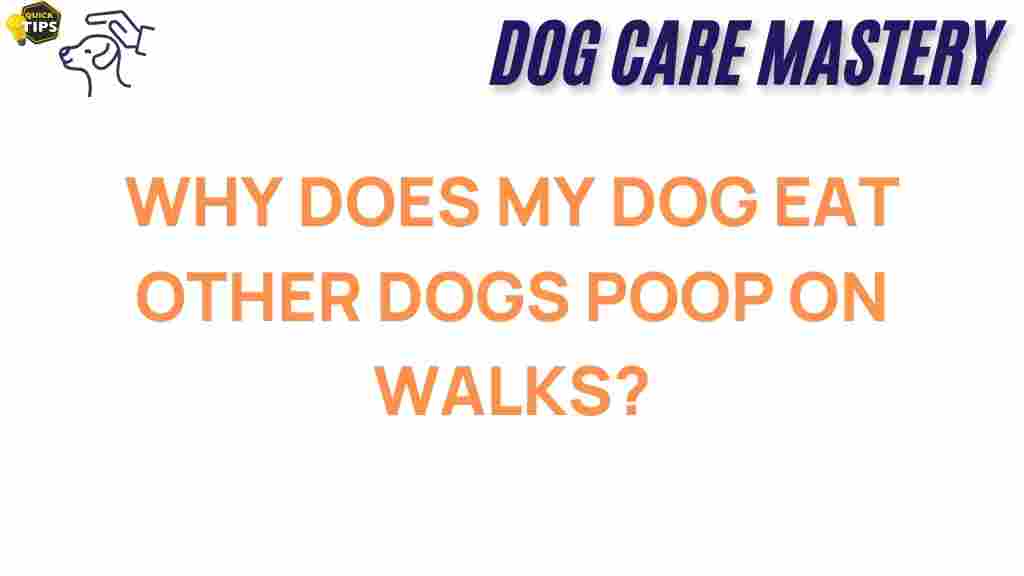The Surprising Reasons Your Dog Can’t Resist Eating Poop: Understanding Dog Behavior
If you’re a dog owner, you’ve likely experienced the shock and dismay of watching your furry friend indulge in what many consider the most unappetizing of habits: coprophagia, or the consumption of feces. This behavior can be baffling, often leading to feelings of embarrassment and confusion. However, understanding the underlying reasons for this behavior is essential in addressing it effectively. In this article, we will explore the surprising reasons behind this behavior, offering insights into dog behavior, practical solutions, and tips for managing this issue.
Understanding Dog Behavior: Reasons for Coprophagia
Dogs are creatures of instinct, and their behaviors often stem from their evolutionary background. Below are some common reasons dogs might eat poop:
1. Instinctual Behavior
In the wild, dogs and their ancestors would instinctively consume feces to keep their living environment clean and reduce the risk of attracting predators. This behavior can be traced back to their survival instincts.
2. Nutritional Deficiencies
If your dog is lacking certain nutrients, they might turn to poop as a source of those missing elements. This is particularly common in dogs that are on a poor-quality diet or those that have health issues affecting nutrient absorption.
3. Attention-Seeking Behavior
Some dogs may engage in coprophagia as a way to get attention from their owners. If a dog realizes that eating poop elicits a strong reaction, whether positive or negative, they might repeat the behavior for that interaction.
4. Stress and Anxiety
Dogs may consume feces as a coping mechanism for stress or anxiety. Changes in their environment, such as moving to a new home, the arrival of a new pet, or even loud noises, can trigger this behavior.
5. Mimicking Other Dogs
Puppies learn behaviors from their mother and littermates. If they observe other dogs eating feces, they may imitate this behavior without understanding its implications.
Step-by-Step Process to Discourage Coprophagia
Understanding the reasons behind your dog’s poop-eating behavior is only the beginning. Here’s a step-by-step guide to discourage this habit:
Step 1: Consult Your Veterinarian
Before implementing changes, it’s crucial to rule out any underlying health issues. A visit to your vet can help identify nutritional deficiencies or gastrointestinal problems that may contribute to this behavior.
Step 2: Improve Diet Quality
Ensure your dog is receiving a balanced and high-quality diet. Look for dog foods that meet their specific nutritional needs and consult your vet for recommendations. A well-nourished dog is less likely to seek out feces for nutrients.
Step 3: Clean Up Promptly
To reduce the temptation, clean up your dog’s yard or any areas they have access to promptly. Keeping the environment free of feces minimizes opportunities for them to indulge in coprophagia.
Step 4: Use Deterrents
Consider using deterrents that can be added to your dog’s food to make their stool taste unpleasant. Products containing enzymes or specific herbs can help discourage the behavior.
Step 5: Increase Exercise and Mental Stimulation
A bored dog is more likely to engage in undesirable behaviors. Increase your dog’s physical exercise and provide mental stimulation through toys, puzzles, and training sessions to keep them occupied.
Step 6: Redirect Behavior
If you catch your dog in the act, redirect their attention with a command or a toy. Reward them for focusing on appropriate behaviors instead of consuming feces.
Troubleshooting Tips for Persistent Coprophagia
Even with the best intentions, some dogs may continue to eat poop. Here are some troubleshooting tips:
- Monitor Stress Levels: Keep an eye on your dog’s environment and stressors. If they seem anxious, consider implementing calming products or techniques.
- Consistency is Key: Be consistent in your training and cleanup efforts. Inconsistency can confuse your dog and prolong the behavior.
- Professional Help: If the problem persists, consider seeking help from a professional dog trainer or behaviorist who specializes in dog behavior.
- Consider Medication: In some cases, medication may be necessary to address underlying anxiety. Consult your veterinarian for options.
Conclusion
While the sight of your dog eating poop may be shocking, understanding the reasons behind this behavior is crucial for addressing it effectively. By improving your dog’s diet, providing mental and physical stimulation, and using consistent training techniques, you can help curb this behavior. Remember, patience and persistence are vital in changing your dog’s habits. If you’re struggling, don’t hesitate to reach out for professional help.
For more insights into dog behavior and training techniques, check out our related articles and stay informed. Additionally, for more extensive research on canine behavior, visit the American Kennel Club.
This article is in the category Behavior and created by dogcaremastery Team
